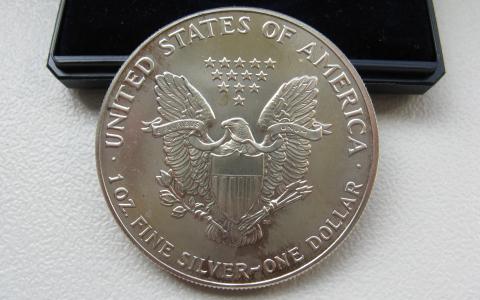
(Fortune) - Hundreds of depositors who handed millions to a silver dealer in exchange for precious minted coins were told their vaults were actually empty following an investigation by the U.S. Commodity Futures Trading Commission (CFTC).
Two firms run by precious metals dealer Robert Higgins have been ordered to pay out $112.7 million to the victims of an alleged complex fraudulent scheme, and $33 million in a civil monetary penalty.
The investigation into Higgins and two connected companies began last year.
According to a statement from the CFTC, between 2014 and 2022 Higgins conducted a fraudulent silver leasing scheme via two companies: Argent Asset Group LLC (Argent) and First State Depository Company, LLC.
The scheme
The plot, sold to customers as the 'Maximus Program', offered to pay owners of silver coins a lease fee in exchange for Argent's use of the commodity.
The payments were on a "scale" and would increase or decrease depending on how many of their coins the client was willing to offer.
The coins were either already owned by the customers, or could supposedly be purchased through Argent, and were apparently in storage at a vault owned by First State Depository Company in Delaware.
Customers were also told their investments were guaranteed and fully insured.
Coins such as these—silver American Eagle dollars—are often purchased by investors who want to see something tangible for their money, as opposed to government bonds or stocks.
People buy the coins because—although they only have a $1 face value—they are made up of 99.9% fine silver, and thus hold their value as a precious metal as opposed to as a currency.
The bullions are also produced by the U.S. Mint, which guarantees their authenticity and are minted—or stamped—in limited numbers to guarantee their rarity. Currently, uncirculated silver 1oz coins from the 2023 release can be bought for $76 each.
The clients were also under the impression they had an eye on their income from the coins, as they were sent monthly reports from the company which prosecutors allege "falsely indicat[ed] that the assets remained safely stored at FSD."
Vanishing coins
Court documents show that vast quantities of the coins apparently stored at the FSD facilities simply did not exist.
Documents published on June 20 reveal that accountants from Baker Tilly attended the vault to conduct an inventory check and found that nearly $113 million in client and customer assets were missing.
"In some instances, they found empty boxes at FSD with a customer’s or client’s name on it, or boxes that did not contain metal but instead held an “IOU” of sorts—a piece of paper stating the quantity of metal that should have been stored there," the document seen by Fortune continues.
It goes on to add that in some customer cases no records had been kept at all—not even an empty box with their name on it.
Further inventories seen by Fortune show that Baker Tilly had expected to find around 1.2 million Silver American Eagle coins and instead discovered just under 380,000.
Likewise, the accountants also expected to find 11,125 Gold American Eagle coins and discovered just 1,936.
As a result, attorneys for the CFTC allege that the defendants "misappropriated" the coins, either using or selling them for their own benefit.
The CFTC also claims that some customers who had paid for more bullions never got them, with the parties instead pocketing the cash.
The CFTC's director of enforcement, Ian McGinley, said he was committed to "rooting out fraud" in the precious metals market.
However, the body cautioned that although the damages had been awarded to customers there is no guarantee they will get the funds back as the defendants may not have enough assets.
Customers looking for updates on the case will be able to find them on the First State Depository Company website which has been taken over by administrators.
This story was originally featured on Fortune.com.
By Eleanor Pringle



